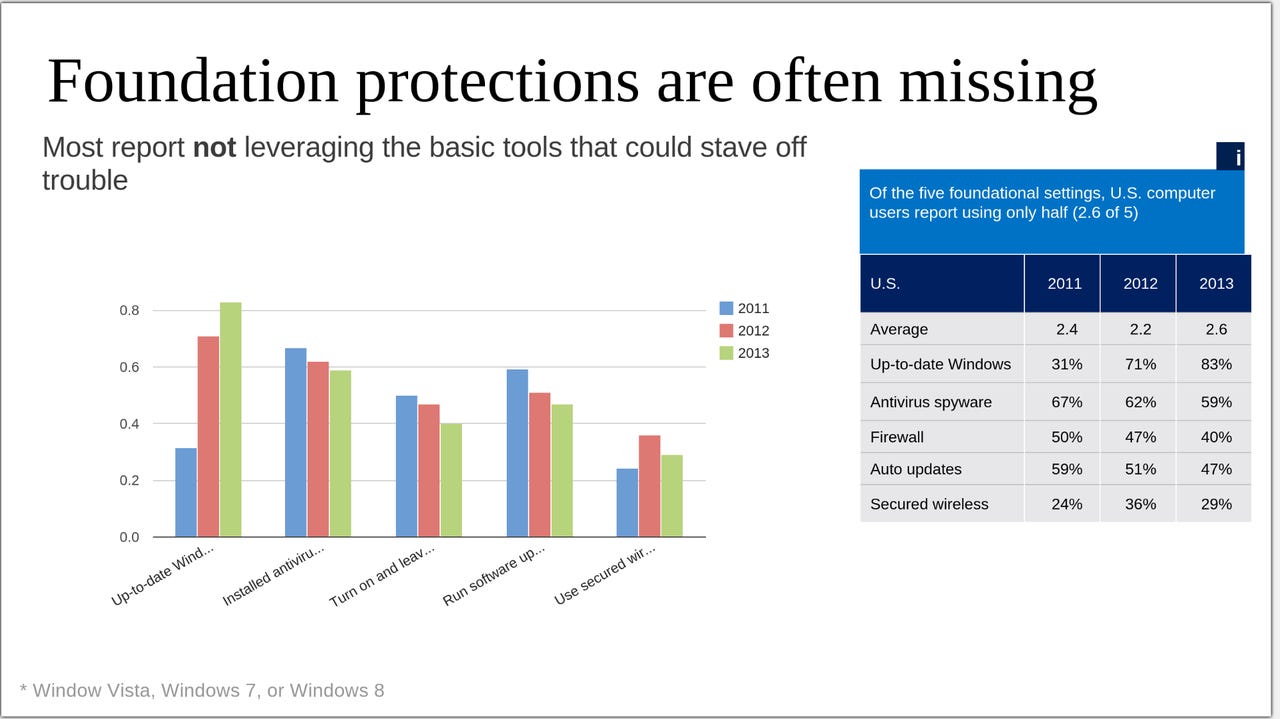Shame on you! Report shows users lazier than ever about security practices

The NSA is in our in-box, malware is everywhere, and Web sites are getting knocked off by hackers ever other day. So you might think us computer users would be trying to take better care of our home computers. You would be wrong.

At the @Microsoft Conversations event in Washington DC on September 12, 2013, Microsoft released its latest Microsoft Computing Safety Index (MCSI) results for worldwide consumer computer security. The results were awful.
The MCSI is a tiered security scoring system. It was first developed in a 2011 study sponsored by Microsoft's Trustworthy Computing Online Safety group. The survey contains more than 20 steps consumers can take to help protect themselves online. The more steps the user reports taking, the higher the online safety score; 100 is the highest rating possible.
Would you care to guess what the average score is in the United States?
Ready?
It's 34 out of 100.
Featured
That's an F by anyone's scoring. What's even more troubling: We're getting worse. In 2012, U.S. Internet users scored 36; in 2011, they came in at 37.
To quote Microsoft, "As the Internet has become a ubiquitous part of life, U.S. consumers are less vigilant about protecting their safety online." (PowerPoint Link)
They've got that right. We may claim that we're trying to be better about protecting our privacy online, but the reality is, most users aren't doing so.
Digging into the results further, we find that while Windows users are more often using up-to-date versions of the OS (Vista and up), in all other ways they're actually less fundamentally secure than they were in 2012. Specifically, only 59-percent are using anti-virus software (a must on Windows systems); 40-percent are using firewalls; 47-percent are updating their operating systems; and a mere 29-percent use secured Wi-Fi for their networks.
These people don't need to worry about the NSA looking over their shoulders when any 13-year old script kiddie could bust into their systems.
But, wait! It gets worse!
According to Microsoft, "Looking year over year, the U.S. score indicates a decline in consumer behaviors when it comes to taking proactive steps that help protect themselves online. Compared with 2012, this year’s scores were down slightly overall (36 in 2012 vs. 34 in 2013) with a downturn in implementing technical protections, like using phishing & Web browser filters, and behavioral protections, like creating a unique passwords for each account."
This is frightening. Things really have never been more dangerous on the Internet. The generation of users who grew up with computers is acting as if they can use computers without even the baby security sets.
I think, I hope, most ZDNet users know better than this. But, there's no question that many of your friends and family members don't. Grit your teeth, take off your “I will not fix your computer” t-shirt, and help them update their operating systems and programs. Get them to use antivirus software, turn on their firewalls, and secure their Wi-Fi access points.
Then, just pray that one day your non-techie friend doesn’t call you up screaming that someone just cleaned out his bank accounts and ran up his credit card bills. Because, with lousy security like this, times have never been better for cyber-criminals.
Related Stories: